Dentures – Henderson, NV
Trusted Solutions for Missing Teeth
Tooth loss can affect everything from how you eat and speak to the way you feel about your appearance -- and the majority of adults will have lost at least one tooth by the age of 55. Finding an effective tooth replacement option is of the utmost importance after teeth have gone missing. Your restorative dentist, Dr. Brett Noorda, provides high-quality solutions at Dental Excellence: Dr. Brett Noorda. Our dentures in Henderson are a trusted and recommended option for many patients, and to learn whether they’re right for you, we welcome you to contact our dental office to schedule a consultation.
Why Choose Dental Excellence: Dr. Brett Noorda for Dentures?
- Precisely-Fitted, Digitally-Made Dentures
- We Proudly Accept Dental Insurance
- Implant Dentures Available.
Who’s a Good Candidate for Dentures?

Missing one, several, or all of your teeth? However many you may have lost, dentures can be an incredible solution for rebuilding your smile. These prosthetics are versatile, meaning they can be tailored for every patient’s mouth, and they’re also much more lifelike thanks to modern dental technology. Of course, our team will need to evaluate your oral health through an initial consultation first before determining if you’re a good candidate for dentures. We’ll also walk you through alternative solutions for replacing missing teeth so that you’re aware of your options.
Effects of Missing Teeth

According to the American College of Prosthodontics, tooth loss typically occurs from oral health problems like tooth decay, gum disease, and physical trauma. While certain situations aren’t always preventable, the majority of them can be addressed early on, allowing you to preserve your natural pearly whites.
People with missing teeth often feel the need to hide their smiles due to anxiety and embarrassment. This can even cause them to forego social interactions and events that they might have otherwise enjoyed. Not only can tooth loss impact your confidence, but it can also allow your jawbone to start deteriorating due to a lack of stimulation. Without proper blood flow, the bone tissue can start to weaken and shrink, raising the risk of issues like facial sagging, difficulty speaking, trouble eating, and further tooth loss.
What Qualifies You for Dentures?

If you’re an adult who’s struggling with any number of missing pearly whites, then you’re most likely eligible for receiving dentures. This tooth-replacement solution has been used for decades, helping patients regain their ability to talk, chew, and smile confidently. The materials used to construct them are also much more reliable than before, so you can expect to enjoy a more natural-looking and -functioning prosthetic that can last many years.
Of course, we’ll need to ensure that your oral health is in good condition, including your gums and jawbone. Reducing the risk of disease and infection will need to be done before providing you with your final dentures. The number of teeth that you’ve lost will also determine the kind of prosthetic you’ll receive, such as a partial, full, or implant denture. Also, this treatment is much more affordable compared to other solutions, allowing most patients to work within their budgets while renewing their bite.
Alternative Tooth-Replacement Options
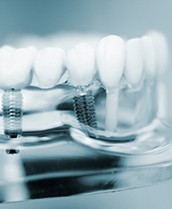
Not a candidate for dentures? Our team offers alternative treatments to help you rebuild your smile, including:
- Dental Bridges: This restoration consists of two dental crowns connected by pontics that are designed to “bridge” the gap in your grin. This requires the adjacent natural teeth on either side of the space to have some enamel removed to make space for the crowns.
- Dental Implants: We can place titanium posts directly into your jawbone to support your new crown, bridge, or denture. This solution requires adequate jawbone density to be successful, and once your implants have fused with the bone tissue, you can expect your brand-new smile to last the rest of your life as long as you take good care of them.
Traditional Dentures
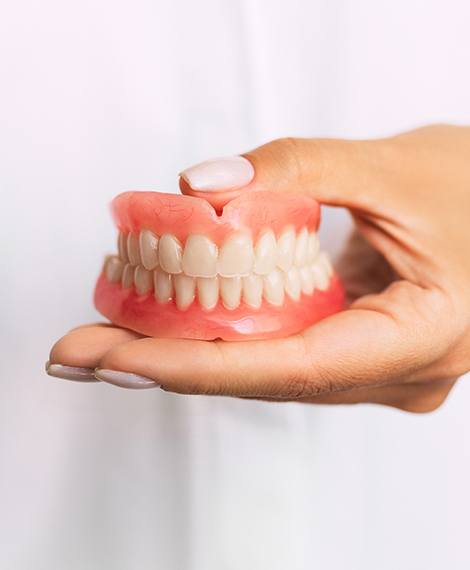
A traditional denture is a set of prosthetic teeth affixed into an acrylic base designed to look just like your natural gum tissue. It can be used to replace an entire arch of missing teeth in the upper or lower jaw. A traditional denture is secured in the mouth using natural suction. Denture cream or adhesive can provide additional security for a traditional denture.
With proper care and maintenance, a traditional denture will typically last for five to seven years before it requires replacement due to wear and tear and natural changes in your bone structure. At Dental Excellence: Dr. Brett Noorda, our dentures are created with an impeccable attention to detail to ensure that they look, fit, and function just as well as your natural teeth.
Partial Dentures
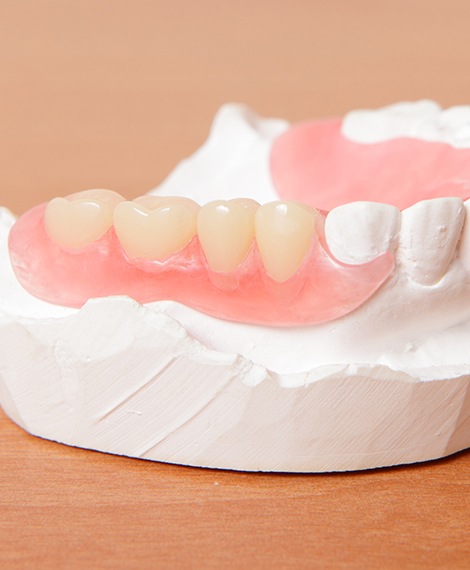
A partial denture is an effective option for patients who have lost a number of teeth but who still have several healthy natural teeth remaining. The partial fills in the gaps in the smile much like a missing puzzle piece. Patients requiring a partial denture benefit from a customized tooth replacement that is held in place using metal brackets affixed around the natural teeth. It restores the ability to eat, speak, and smile with confidence while also preventing the natural teeth from drifting out of place.
Implant Dentures
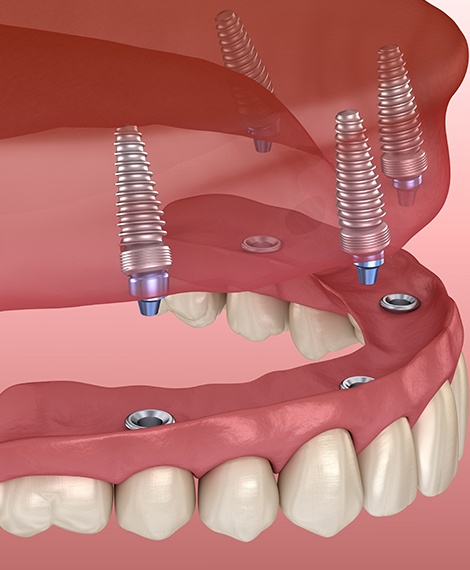
Compared to traditional dentures, an implant denture offers superior stability for eligible candidates. Rather than being supported on the gum tissue, this type of denture is secured on sturdy dental implant posts that have been placed beneath the gum line. Dental implants promote better oral health because they provide prosthetic tooth roots for the jaw, which brings blood flow and important nutrients to the bone structure. Patients who have an implant denture enjoy better oral health over time for this reason.
Some advantages you can enjoy by combining dental implants with dentures include:
- A more stable tooth replacement
- Natural looking and feeling replacement teeth
- Lifespan of 35+ years
- Promote better oral health
- Denture fits properly from day one and for years to come
- Fewer replacements/adjustments are needed for the denture
Patients should be in suitable oral and overall health in order to be eligible for dental implants.
How Dentures are Made
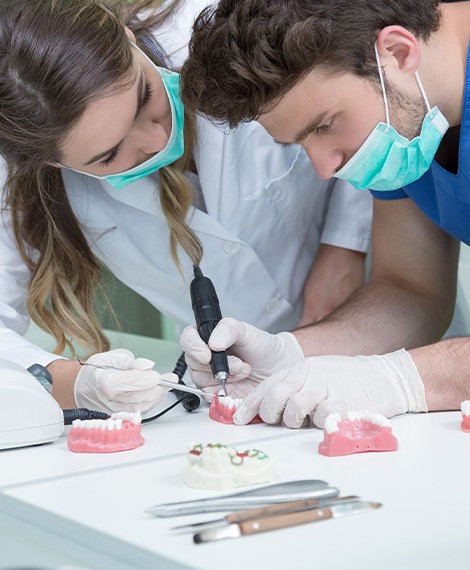
Before you get dentures, you may want to learn how they’re made. It’s a common concern – folks like knowing what goes into their replacement teeth. Given that fact, we at Dr. Noorda’s office will gladly share the steps of denture creation with you. Reviewing them will help you see why and how our replacement teeth work so well! So, please keep reading or call us to learn the relevant details.
What are Dentures Made Of?
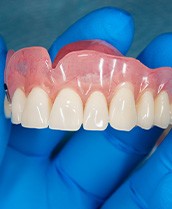
Whatever its type, a denture will always have a base and artificial teeth. These two parts are crucial to the whole device and ensure it works correctly. With that said, consider their details below:
- Denture Base – Serving as its foundation, a denture’s base keeps its artificial teeth secure. It’s often made of pink-colored acrylic or effective substitutes like nylon.
- Artificial Teeth – A denture’s artificial teeth are its tooth-replacing parts. Normally, labs make them from resin or porcelain to match your smile’s color.
The Denture Creation Process
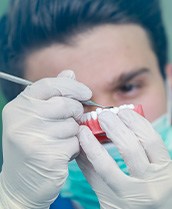
Since each denture is customized for its patient, making one involves a multi-step process. These key steps include:
- Step 1: Dr. Noorda will use a dental impression to design a plaster model, which will be made to match your final denture’s size and shape.
- Step 2: The model will be sent to a lab and used to make a wax gumline based on your grin.
- Step 3: Once the wax gumline is ready, workers will set artificial teeth in it; doing so forms a prototype denture.
- Step 4: After we receive the prototype, our practice will check it against your mouth. We’ll then send it back when we’ve confirmed its fit.
- Step 5: A worker will place the prototype in a flask after removing wax from it. Next, they’ll apply plaster to the flask and have it sit in hot water.
- Step 6: A separator will go into the plaster layer, keeping the acrylic from sticking. This acrylic will be injected into the flask to replace the wax.
- Step 7: The dental lab will remove all plaster to reveal the final denture. Then, they’ll place the restoration in a bath to remove its residue.
- Step 8: The lab’s workers will remove your denture’s excess acrylic and polish its surface.
- Step 9: To ensure it works smoothly and easily, our office will fit your final denture for you.
Adjusting to Your New Dentures
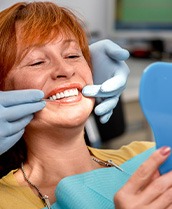
Your mouth will likely feel sore as you first adjust to dentures, but don’t worry; this symptom is normal and quickly fades. Once you’ve gotten used to your new teeth, they should feel more familiar.
Of course, you can take steps to speed up your adjustment. One option would be to eat soft foods for a while to avoid irritated gums. Similarly, you could use adhesives for security or exercise your facial muscles. These and other approaches would help your dentures feel more familiar quickly.
If pain from your adjustment lasts a long time, please call us. Your new dentures may need further alterations to enhance their fit.
Understanding the Cost of Dentures

Dentures are a lifechanging tooth replacement option for those who are missing most of or all of their teeth. However, one concern many patients have is the cost of their new smile. During your consultation with us, we will discuss the cost of your treatment in detail so you will know exactly what you can expect. Until then, here are some things to take into consideration.
Factors That Affect the Cost of Dentures

There are various factors that contribute to the cost of dentures. Here are some of the most prominent ones that patients experience:
- Preparation: If your mouth needs to be prepared with preliminary procedures, like a tooth extraction or gum disease treatment, you should consider these costs.
- Material: Dentures can be made from multiple materials. They are all at different price points.
- Type of Denture: Generally speaking, the larger the prosthetic, the higher the cost. Implant dentures are priced the highest because they require a surgical procedure.
Are Implant Dentures More Expensive?
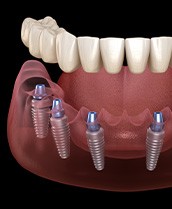
Implant dentures have a higher cost than traditional dentures. This is because the dental implants need to be surgically placed in the jaw. This technique gives patients multiple additional benefits. Implant dentures are made to be permanent, they are more stable, and they are more comfortable in the mouth. You don’t need to worry about shifting, slipping, clicking, or dietary restrictions. Dental implants are an investment in the future of your smile, so the investment pays off over the years.
Does Dental Insurance Cover Dentures?
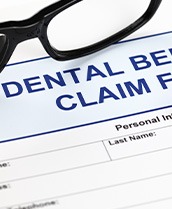
Dental insurance providers generally consider dentures to be a major restorative treatment, so they are covered up to 50% after your yearly deductible has been met and before you reach your maximum. However, it’s important to note that every plan is different, so it’s important to review your benefits ahead of time so you don’t run into any surprises. We are proud to be in-network with many popular dental insurance plans. If you have any questions or concerns regarding your benefits, don’t hesitate to talk to one of our friendly team members.
Other Options for Making Dentures Affordable

If you don’t have dental insurance, this doesn’t mean that you are out of luck in terms of the cost. We have an in-house membership savings program that includes a significant discount on treatments completed at our practice. We are also happy to accept payments through CareCredit, Lending Club, and Sunbit – third-party financing companies that can split the cost of your treatment into manageable monthly installments with little to no interest. If you need help applying or want to learn more, contact our office.
Let’s Talk
About Dentures!
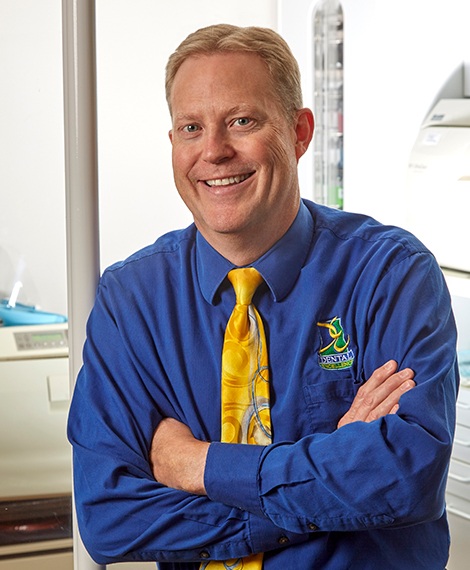
If you are missing a substantial number of teeth, a full or partial denture can provide a wonderful replacement option. Dental implants offer added security for a traditional denture. Find out about your options for rebuilding your smile by contacting the dental office of your dentist, Dr. Brett Noorda!
Dentures Frequently Asked Questions
How do I take care of my dentures?
Taking care of your dentures should be pretty easy. If you have a permanently fixed, implant denture, you can brush and floss similarly to how you would for your natural teeth. If you have a removable prosthesis, you should:
- Keep your dentures moist when you’re not wearing them by placing them in a denture-soaking solution.
- Gently brush your dentures so you can prevent stains and bad breath.
- Handle your dentures with care; stand over a folded towel or a bowl of water when you remove them so if you accidentally drop them, they’re less likely to break.
- Clean your gums daily with a soft, wet cloth to get rid of bacteria and any leftover denture adhesive.
How often do I need to see the dentist when I have dentures?
Some people operate under the mistaken belief that, if they have dentures, visiting their dentist in Henderson regularly is no longer necessary. However, there are several reasons why you should still see a dental professional twice a year:
- If you have any natural teeth remaining, it is important to get these cleaned and examined.
- Oral cancer is a risk for everyone, regardless of how many teeth they have. Your dentist can perform a quick screening during your appointment.
- Your dentist can look for signs of gum disease and help you treat any issues with your gums before they become severe.
- Your appointments are the perfect opportunity to ask your dentist any questions you have about your oral health.
When do I need to replace my dentures?
On average, removable dentures need to be replaced once every five to seven years or so. That is because after you lose teeth, you experience significant bone loss in the jaw. This bone loss changes the way dentures fit, and eventually the changes reach the point where your artificial teeth are no longer comfortable for you to wear. When you start to notice that your dentures no longer fit right or are causing you pain, it’s important to pay a visit to your dentist to find out if it’s time to get a replacement.
How much do dentures cost?
The cost of your dentures in Henderson will depend on a number of factors, including:
- How many teeth you need to replace.
- The materials used to make the dentures.
- Whether you want a removable prosthesis or implant dentures
We’ll crunch some numbers with you during your consultation so you understand exactly what your financial obligation we’ll be. We’ll also be happy to file a claim with your insurance company or arrange a payment plan to help you manage the cost of your new smile.
What if my dentures are irritating my gums?
If your dentures are irritating your gums after wearing them for years, it’s possible that they no longer fit right. It could also be that you’ve been wearing your dentures too much and you need to let your gums rest a bit. Whenever you experience gum discomfort because of your dentures, don’t hesitate to get in touch with us. We’ll help you find out why you’re in pain and give you suggestions on how to deal with the issue.
